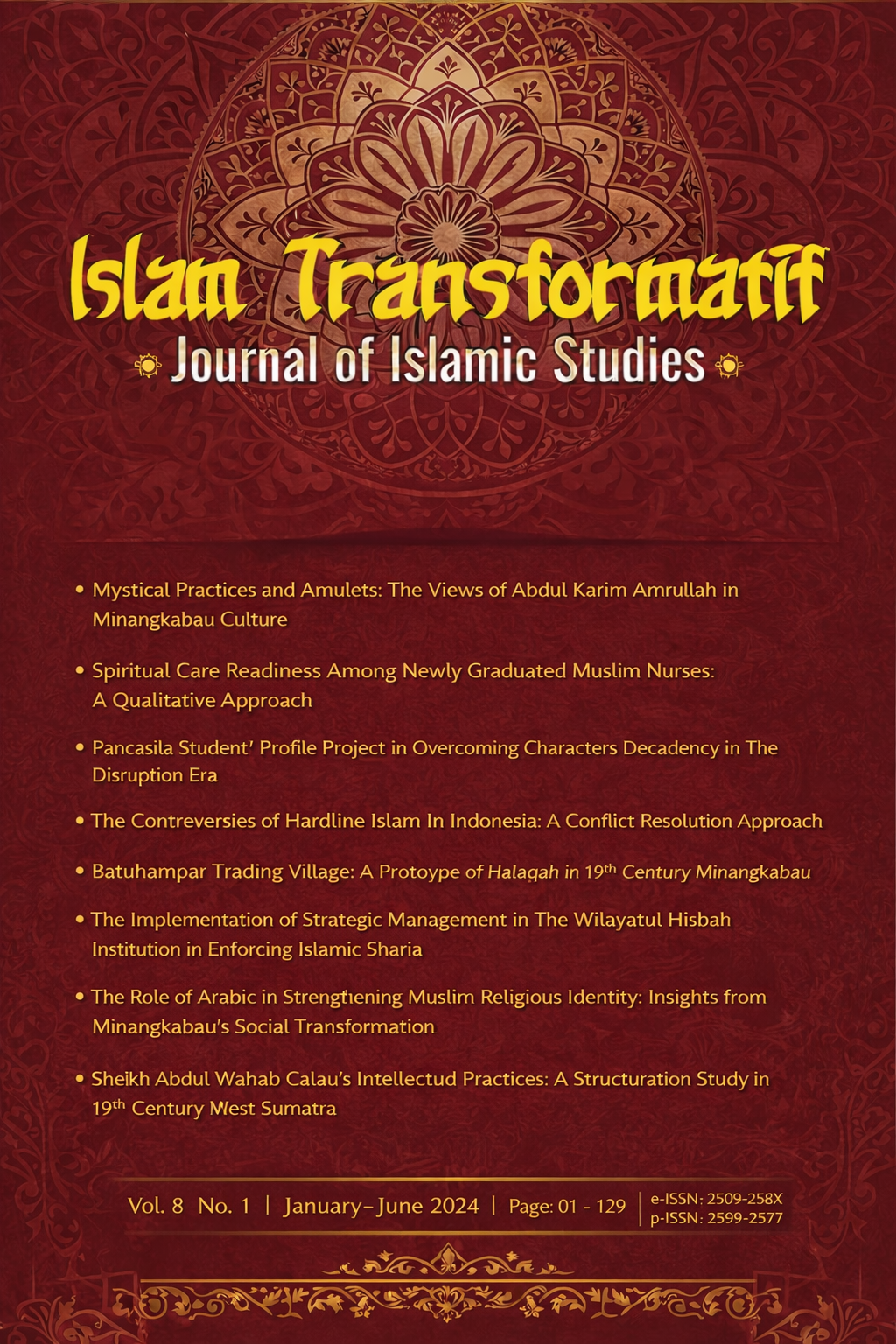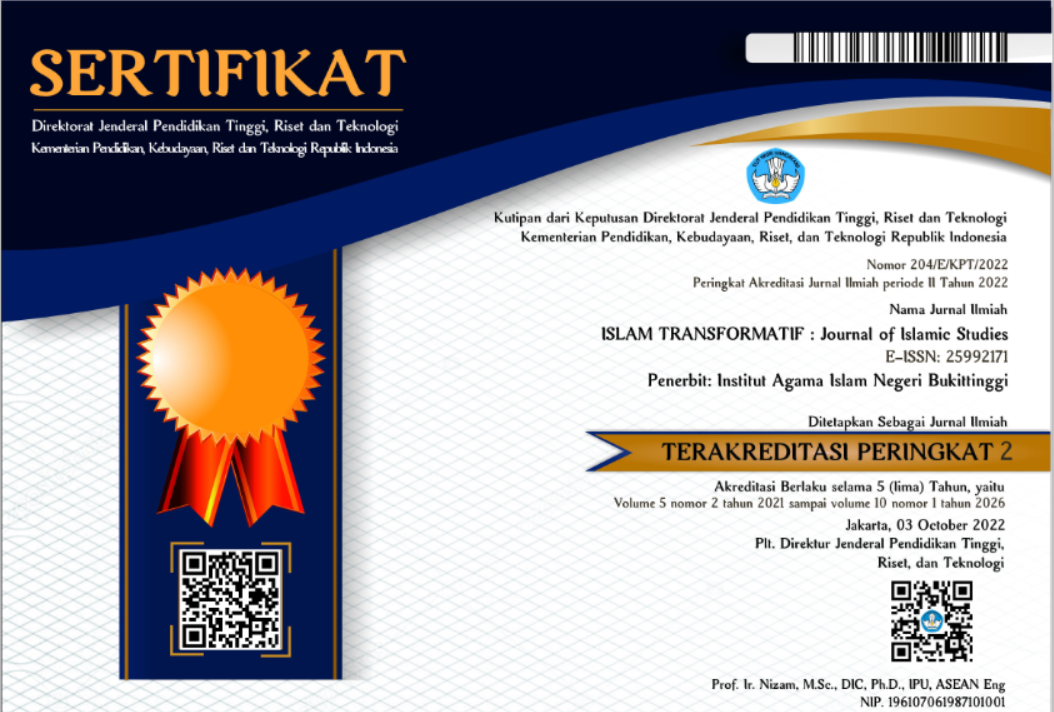Pancasila Student' Profile Project in Overcoming Characters Decadency in The Disruption Era
DOI:
https://doi.org/10.30983/it.v8i1.8421Keywords:
Character Decadence, Disruption Era, Pancasila Students’ Profile Project (P5)Abstract
Pancasila Student Profile Strengthening Project, known as P5, is a new solution to build valuable students' characters. This study analyzes how P5 was implemented in schools to conquer character decadency in the disruptive era. This study used a qualitative research design to collect the data and a triangulation test to validate the data. The research data was collected in three elementary schools in Bengkulu City. The findings indicate that P5 is running well at the sample schools by looking at several indicators, such as the policy, program, and implementation of P5. Based on the data, the schools accepted and implemented P5 to swamped character decadence in the period of disruption well, allowing it to be socialized and applied as needed. However, every school has successfully utilized P5 techniques to overthrow character decadence in the disruptive era. Despite the challenges and limitations associated with its implementation, the principal has the ability to mitigate these issues. The principal and educators hope the school can best apply P5 to combating character decadence in the disruptive period, making it more advantageous for the larger community.
References
[Kemdikbud] Kementerian Pendidikan dan Kebudayaan. Permendikbud Nomor 22 Tahun 2020 Tentang Rencana Strategis Kementerian Pendidikan dan Kebudayaan Tahun 2020-2024 (2020).
[KPAI] Komisi Perlindungan Anak Indonesia. “Catatan Pelanggaran Hak Anak Tahun 2021 Dan Proyeksi Pengawasan Penyelenggaraan Perlindungan Anak Tahun 2022.” www.kpai.go.id, 2022.
Anjarwani, Ratih. “Building an Entrepreneurial Spirit in Early Childhood with Traditional Market Games.” In Seminar Nasional Pgsd 2016, 2016.
Axelsson, K., S. Hägglund, and A Sandberg. “Entrepreneurial Learning in Education Preschool as a Take-Off for the Entrepreneurial Self.” Journal of Education and Training 2, no. 2 (2015): 40. https://doi.org/https://doi.org/10.5296/jet.v2i2.7350.
Bungin, M. Burhan. Penelitian Kualitatif; Komunikasi, Ekonomi, Kebijakan Publik Dan Ilmu Sosial Lainnya. Jakarta: Kencana Prenada Media Group, 2007.
Creswell, John W. Educational Research: Planning, Conducting, and Evaluating Quantitative and Qualitative Research. 4th ed. Boston: Pearson, 2012.
Darda, Abu. “Integrasi Ilmu Dan Agama: Perkembangan Konseptual Di Indonesia.” At-Ta’dib 10, no. 1 (2015): 40. https://doi.org/https://doi.org/10.21111/at-tadib.v10i1.323.
Dasmana, Ade, Iim Wasliman, and Ricky Yoseptry. “Implementation of Integrated Quality Management Strengthening Character Education in Realizing Pancasila Student Profiles.” International Journal of Graduate of Islamic Education 3, no. 2 (2022): 361–77. https://doi.org/10.37567/ijgie.v3i2.1342.
Fadillah, Syarifah, Mai Yuliastri Simarmata, and Dwi Fajar Saputri. “An Analysis of Elementary School Students’ Character Building through The Pancasila Student Profile Strengthening Project.” AL-ISHLAH: Jurnal Pendidikan Islam 15, no. 3 (2023): 4001–9. https://doi.org/10.35445/alishlah.v15i3.3482.
Firman, Arham Junaidi. “Kaidah Penafsiran Al-Qur’an Dan Urgensinya Di Era Disrupsi.” JURNAL At-Tibyan Jurnal Ilmu Alquran Dan Tafsir 5, no. 1 (2020): 57–73. https://doi.org/10.32505/tibyan.v5i1.1393.
Firman, Arham Junaidi, and Nur Hidayat. “Strengthening Character Education Based on Golden Habits at SMP Muhammadiyah 1 Depok Yogyakarta.” Cendekia: Jurnal Kependidikan Dan Kemasyarakatan 18, no. 2 (2020): 189–210. https://doi.org/10.21154/cendekia.v18i2.1886.
Firman, Arham Junaidi, Ulfatun Ni’mah, and Nova Asvio. “Prototype Curriculum : Concepts and Its Role in Strengthening Character Education After the Covid-19 Pandemic.” EJIP: Educational Journal of Innovation and Publication 1, no. 1 (2022): 10–17.
Given, Lisa M. The Sage Encyclopedia of Qualitative Research Methods. Los Angeles: Sage Publications, 2008.
Hidayah, Nur, and Cita Eri Ayuningtyas. Market Day Dan Karakter Kewirausahaan/Entrepreneurship. Yogyakarta: K-Media, 2022.
Kahfi, Ashabul. “Implementasi Profil Pelajar Pancasila Dan Implikasinya Terhadap Karakter Siswa Di Sekolah [Implementation of the Pancasila Student Profile and Its Implications for Student Character in Schools].” DIRASAH: Jurnal Pemikiran Dan Pendidikan Dasar Islam 5 (2) (2022): 138-151. https://doi.org/https://doi.org/10.51476/dirasah.v5i2.402.
Miles, Mathew B., A. Michael Huberman, and Johnny Saldana. Qualitative Data Analysis: A Methods Sourcebook. 3rd ed. United States, US: Sage Publications, 2014.
Miles, Mathew B., and A. Micheal Huberman. An Expanded Sourcebook Qualitative Data Analysis. California: Sage Publications, 1994.
Moleong, L. J. Metode Penelitian Kualitatif [Qualitative Research Methods]. Bandung: Remaja Rosdakarya, 2019.
Paidi. “In House Training SMK PK SMKN 4 Bengkulu Selesai Dengan Sukses.” http://smkn4bengkulu.sch.id, 2021.
Rahayu, Dewi Puji, and Karlina Wong Lieung. “Analysis of Implementation the Project of Pancasila Student Profiles Reinforcement at Local Wisdom Theme Phase B SD Advent Merauke.” Technium Social Sciences Journal 49, no. 1 (2023): 509–516. https://doi.org/10.47577/tssj.v49i1.9850.
Remiswal, Martin Kustati, Besral, Zainimal, and Arham Junaidi Firman. “The Influence of Hedonistic Culture to Minangkabau Juveniles’ Social Behaviors in the Twenty-First Century.” Fudan Journal of the Humanities and Social Sciences 14 (2021): 465–481. https://doi.org/10.1007/s40647-021-00319-5.
Sriwahyuni, Eci, Jefril Rahmadoni, Saifaldin Idris Onia, and Abdul Aziz. “Implementation of the Entrepreneurship Program in Preparing Students Become Entrepreneurs.” Journal of Social Work and Science Education 4, no. 1 (2023): 27–43.
Subiyantoro, Slamet, Dimas Fahrudin, and Sony Baroo Amirulloh. “Character Education Values of Pancasila Student Profiles in the Puppet Figure Wayang Arjuna: A Javanese Cultural Perspective.” Journal of the International Society for the Study of Vernacular Settlements 10, no. 6 (2023): 106–18.
Sugiyono. Metode Penelitian Kuantitatif, Kualitatif, Dan R&D. Bandung: Alfabeta, 2018.
Suharyoto, Leonita Siwiyanti. “Menanamkan Nilai Kewirausahaan Melalui Kegiatan Market Day.” Golden Age: Jurnal Pendidikan Anak Usia Dini 1, no. 1 (2017): 15–17. https://doi.org/10.29313/ga.v1i1.2861.
Supomo, R., and E. Nurhayati. Manajemen Sumber Daya Manusia. Bandung: Yrama Widya, 2018.
Widana, I. Wayan, I. Wayan Sumandya, and I. Wayan Citrawan. “The Special Education Teachers’ Ability to Develop an Integrated Learning Evaluation of Pancasila Student Profiles Based on Local Wisdom for Special Needs Students in Indonesia.” Kasetsart Journal of Social Sciences 44, no. 2 (2023): 527–36. https://doi.org/10.34044/j.kjss.2023.44.2.23.
Widarini, Ni Wayan Wini, and Ni Ketut Suterji. “Implementation of The Profile Strengthening of Pancasila Student Profile (P5) in Building Student Character in First Middle School.” International Journal of Multidisciplinary Sciences 1, no. 2 (2023): 218–31. https://doi.org/10.37329/ijms.v1i2.2276.
Wulandari, Ranti. “Implementasi Kebijakan Gerakan Literasi Sekolah Di Sekolah Dasar Islam Terpadu Lukman Al Haim Internasional.” Jurnal Kebijakan Pendidikan UNY 6, no. 3 (2017): 319–30. https://doi.org/https://doi.org/10.21831/sakp.v6i3.9256.
Zakso, Amrazi, Iskandar Agung, Etty Sofyatiningrum, and M. Calvin Capnary. “Factors Affecting Character Education in the Development of the Profile of Pancasila Students: The Case of Indonesia.” Journal of Positive School Psychology 6, no. 2 (2022): 2254–73.
Downloads
Published
How to Cite
Issue
Section
Citation Check
License
Copyright (c) 2024 Mindani, Nova Asvio, Asmara Yumarni

This work is licensed under a Creative Commons Attribution-ShareAlike 4.0 International License.
Authors who publish with this journal agree to the following terms:
- Authors retain copyright and grant the journal right of first publication with the work simultaneously licensed under a Creative Commons Attribution-ShareAlike 4.0 International License that allows others to share the work with an acknowledgment of the work's authorship and initial publication in this journal.
- Authors are able to enter into separate, additional contractual arrangements for the non-exclusive distribution of the journal's published version of the work (e.g., post it to an institutional repository or publish it in a book), with an acknowledgment of its initial publication in this journal.
- Authors are permitted and encouraged to post their work online (e.g., in institutional repositories or on their website) prior to and during the submission process, as it can lead to productive exchanges, as well as earlier and greater citation of published work (See The Effect of Open Access).




